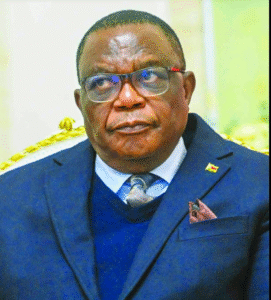CHARAMBA’S DEFENSE OF ZEC SCANDAL EXPOSES DEPTH OF ZIMBABWE’S ROTTEN POLITICS
The recent Zimbabwe Electoral Commission (ZEC) tender scandal has pulled back the curtain on the extent of corruption rotting the country’s democratic processes. What started as yet another suspicious procurement deal has now erupted into a full-blown scandal implicating some of the most powerful individuals in Zimbabwe’s political and business elite. At the center of the storm is George Charamba, the government’s spokesperson, whose role in defending the indefensible has added fuel to the fire.
Charamba, a civil servant who should be neutral and professional, has chosen instead to weaponize his social media platforms to attack journalists and citizens exposing government corruption. His targets have included The NewsHawks, a local investigative media outlet that has courageously exposed the multimillion-dollar scandal engulfing ZEC. Rather than demand transparency or accountability, Charamba has chosen to shield the regime with belligerent tweets and venomous insults.
This scandal is not about misplaced paperwork or minor administrative errors. It is about the systematic looting of public resources and the deliberate erosion of electoral credibility in Zimbabwe. According to reports, ZEC awarded questionable tenders worth millions of dollars to businessmen with known political affiliations, including Wicknell Chivayo, Moses Mpofu, and Scott Sakupwanya. These tenders, linked to election logistics and materials, were handed out without competitive bidding, transparency, or proper oversight.
The network of corruption does not stop at business figures. Top state officials, including the Chief Secretary to Cabinet Martin Rushwaya and Central Intelligence Organisation Director-General Isaac Moyo, have also been implicated. These are individuals whose roles should be to uphold public trust, not to participate in schemes that corrupt it. That the ZEC Chairperson Priscilla Chigumba is also involved only worsens public distrust in the institution tasked with overseeing free and fair elections.
Charamba’s role in this unfolding mess is especially disgraceful. As the face and voice of President Emmerson Mnangagwa’s administration, he has used his position to defend a broken system. Instead of engaging with the facts or showing remorse for a scandal that undermines Zimbabwe’s democracy, he has waged war against the truth. His Twitter feed, a collection of angry rants and conspiracy theories, reveals a man more interested in silencing criticism than defending the people’s right to vote freely.
But this is not just about Charamba. His behavior is a reflection of the entire regime’s attitude toward accountability. In Zimbabwe today, corruption is not the exception—it is the rule. The very institutions that should guard the public good are being used to enrich the few and entrench the power of the ruling elite. Electoral commissions, intelligence agencies, and the Office of the President have all become tools in the hands of a cabal that fears transparency and despises scrutiny.
The ZEC scandal comes at a time when Zimbabwe’s democracy is already on life support. The 2023 general elections were widely discredited by local and international observers, including SADC. Now, with evidence of rigged tenders and corrupt procurement practices, it is clear that the rot goes far beyond stolen votes—it reaches into the very mechanics of how elections are organized and executed.
For Zimbabweans, this scandal should not be seen in isolation. It is part of a long pattern where public institutions are captured, dissent is crushed, and elections are treated as rituals rather than reflections of the people’s will. It is a reminder that the struggle for real democracy is far from over.
The brave journalists at The NewsHawks and other independent outlets deserve praise for their work in exposing this scandal. Their investigations have forced a national conversation and put pressure on those in power. But they cannot fight this battle alone. Civil society, opposition leaders, and ordinary citizens must demand accountability—not just for Charamba’s online tantrums, but for the entire web of corruption now exposed.
Zimbabwe cannot move forward while its elections are sold to the highest bidder. It cannot rebuild trust while the President’s spokesman protects criminals and bullies the media. And it cannot claim to be a democracy while the people are denied a clean and fair vote.
This is a test of the nation’s will. Will Zimbabwe continue to accept a corrupt electoral system manipulated by political gangsters and their business partners? Or will the people rise to reclaim their institutions, their voice, and their future?



